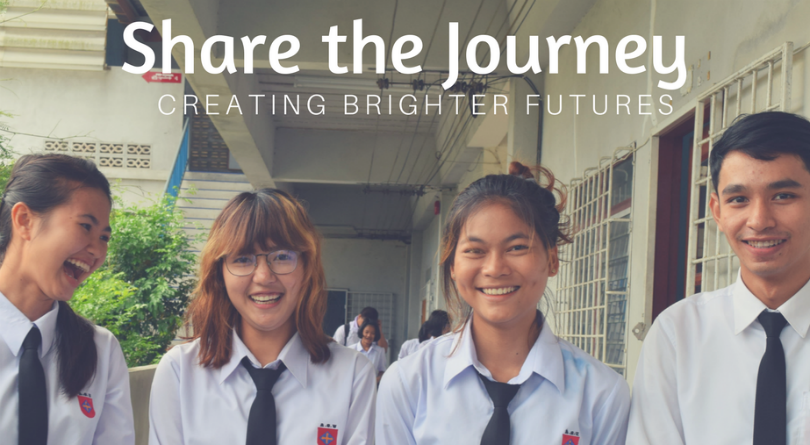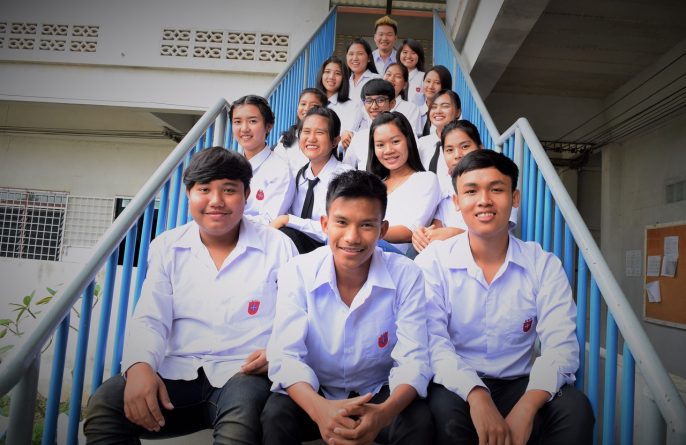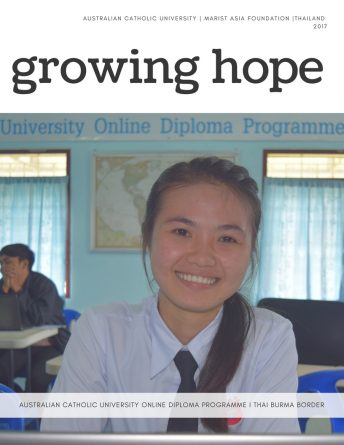Tutoring the Online University Class – Teacher Katie
 This year I have had the privilege of being the tutor for the Australian Catholic University online Diploma programme in Ranong, Thailand. This programme provides tertiary level education for migrants on the Thai/Myanmar border in two locations: Ranong and Mae Sot.
This year I have had the privilege of being the tutor for the Australian Catholic University online Diploma programme in Ranong, Thailand. This programme provides tertiary level education for migrants on the Thai/Myanmar border in two locations: Ranong and Mae Sot.
In Ranong, we have 16 students who will study everything from Management and Development Studies to Global History and World Health over an 18-month period. Most of the study is completed online with a tutor helping to ‘unpack’ the concepts and explain difficult vocabulary. Some courses also have a face-to-face component with lecturers travelling from Australia to spend time with the students.
Most of our students have been through the BMSP secondary education programme at the Marist Asia Foundation. Their parents work in Ranong in a range of industries and work very hard so that their children can benefit from a good education. The students have already overcome many personal and family challenges to reach this level of study.
So what’s it like, coming from New Zealand, to work with these students? Imagine working in a classroom full of engaged, smiling, friendly and fun, studious, and ‘ready to learn’ young people. And, like any good teaching experience, the learning is reciprocal. Not only am I learning about Myanmar language and culture, I’m learning about management, leadership, and resilience in the face of challenging situations.
 Our students are learning about ‘critical thinking’ or seeing different sides of a problem or situation. They are learning to ask questions and challenge the information presented in the course material. They are learning to think about the ‘pros and cons’ of each idea or theory and what their own response might be after reading the research. One week we watched a short film about the plight of the Rohingya people in Myanmar. This challenged them to think beyond their pre-conceived ideas about citizenship to the reality of peoples’ experience, but also that for every problem there are two or more sides to consider.
Our students are learning about ‘critical thinking’ or seeing different sides of a problem or situation. They are learning to ask questions and challenge the information presented in the course material. They are learning to think about the ‘pros and cons’ of each idea or theory and what their own response might be after reading the research. One week we watched a short film about the plight of the Rohingya people in Myanmar. This challenged them to think beyond their pre-conceived ideas about citizenship to the reality of peoples’ experience, but also that for every problem there are two or more sides to consider.
 This month we had a visit from a past student of the ACU programme. She now works at an international bank in Yangon, Myanmar and shared confidently in Burmese and English about her experiences after completing her studies. She stressed the importance of ‘life-long learning’ and shared about the competitive nature of the job-market in Myanmar. Her language and interpersonal skills (not just her academic record) had secured her a good job.
This month we had a visit from a past student of the ACU programme. She now works at an international bank in Yangon, Myanmar and shared confidently in Burmese and English about her experiences after completing her studies. She stressed the importance of ‘life-long learning’ and shared about the competitive nature of the job-market in Myanmar. Her language and interpersonal skills (not just her academic record) had secured her a good job.
That’s our hope for all our students then, that they will be ‘workplace’ ready with academic knowledge (competency), social skills (chemistry), and life skills (character). We also hope they will give back to their community in some way, either here in Thailand or in Myanmar and make the most of the opportunity they have been given.
As for me, I’m enjoying this opportunity I have been given. Thank you Marist Asia Foundation and the Australian Catholic University for your commitment to this special project.
